Understanding the Stages of Chronic Kidney Disease

Approximately 30 million people suffer from chronic kidney disease. When you have chronic kidney disease, you have two choices: a lifetime of dialysis or a kidney replacement.
Keep reading to learn everything you need to know about the stages of chronic kidney disease.
What do Kidneys Do?
To fully understand kidney disease, you must first understand the critical function of kidneys. These two bean-shaped organ rest just below your rib cage, flanking your spine. They rid your body of waste products, drugs, and toxins.
Kidneys act as a filter, allow you to keep the good stuff you need to feed your muscles and organs, and transporting the waste through your urine.
Your kidneys do more than just filter, though. They regulate the electrolyte or salt concentrations in your body along with the amount of fluid in your body. They also regulate blood pressure.
Kidneys will maintain acid-base balance and produce hormones that affect both your blood and bones.
These two, small organs are essential to life. You cannot live without them, so when a disease affects them, your life is in danger.
How Do You Acquire Kidney Disease?
Kidney disease can be caused by a variety of factors, some of which you can control.
For example, the two leading causes of kidney disease are diabetes and high blood pressure. With diet and exercise, an individual can reduce the effects of type-2 diabetes and can sometimes lower his or her blood pressure.
A third, more rare cause of kidney disease, is glomerulonephritis. This disease damages the kidney’s filtering units. It has no known cause, but doctors have recognized that infections can trigger it.
Chronic kidney infection and kidney stones can lead to kidney damage and chronic kidney disease as well. The overuse of over-the-counter pain killers along with illegal drugs like heroin have proven to wreak havoc on kidney function and caused irreparable damage. The inherited disease polycystic kidney disease also leads to chronic kidney disease and kidney failure.
What Are the Stages of Chronic Kidney Disease?
Kidney disease has specific stages that mark it. Just because an individual has kidney disease does not mean he or she is in dire need of a new kidney.
First, you need to understand the two different references to kidney problems.
Acute kidney failure results from an injury. If an individual is in a car accident, for example, and his or her kidneys sustain an injury, he or she may be in acute kidney failure.
Chronic kidney disease, however, develops over time. Essentially, with chronic kidney disease, your kidneys cannot properly filter
Stage One Kidney Disease
Stage one and two are the mildest stages of kidney disease. At this point, doctors recognize your kidneys are damaged and not working to their full potential.
As a patient, you may feel some pain. You may wonder, “Where is kidney pain?”
Because your kidneys are located between your rib cage and your hip, many people mistake kidney pain for back pain. The pain will typically be on both sides of your spine, just below your rib cage but above your hips.
Stage Two Kidney Disease
At stage one, you experience slight damage to your kidneys. You may have no pain, even. At stage 2, however, you begin to have a decrease in your kidney function.
Basically, the damage actually has a consequence at this point, altering your kidney’s ability to filter junk out of your body.
Stage Three Kidney Disease
At this stage, you’ve lost about half of your kidney function. Your kidneys can still work at this stage, but you may notice other problems.
With stage three, your blood pressure will increase, and you’ll have some bone problems. You need to treat these problems as doing so can slow down your loss of kidney function.
Stage 4 Kidney Disease
At stage four, your kidney function has decreased dramatically. You still have some control over the decrease in function, however.
Your doctor will provide you with a treatment plan that you must follow perfectly if you want to avoid a kidney transplant and slow down your kidney disease. You also need to treat and avoid high blood pressure and heart disease.
Stage Five Kidney Disease
Stage five means approximately 85 to 90 percent of your kidney function is gone. You need either a kidney transplant or regular dialysis to survive at this stage.
Avoiding and Slowing Kidney Disease
You do you have some control over preventing kidney disease. The following actions can help you stave off chronic kidney disease and keep you healthier overall.
- Stay Active: Exercise lowers your risk of chronic kidney disease, reduces blood pressure, and increases your heart health. Even just a daily walk can make a difference
- Control Blood Sugar: Kidneys have to work hard to filter blood if you present your body with extra glucose. Years of this kind of exertion leads to damage.
- Monitor Blood Pressure: Try to keep your pressure at 120/80. High blood pressure leads to kidney damage. If you have high chronically high blood pressure, talk to your doctor about medication.
- Drop Weight and Stay There: Your weight puts a strain on your kidneys.
- Modify your diet to be low in sodium and processed foods. Focus on fresh ingredients like fruits and vegetables. Include whole grains and fish to stay healthy.
- Drink Fluids: Drinking plenty of water will keep you hydrated and keep your kidneys flushed.
- The actual amount of water you need depends on your age, gender, and even where you live.
- Don’t Smoke: Smoking directly affects your blood vessels. Damaged blood vessels cannot transport blood efficiently to your kidneys, and this leads to kidney damage.
- Limit Pills: An ibuprofen every once in a while is fine, but if you find yourself popping a pain pill daily, you could be damaging your kidneys. NSAIDs especially can damage kidneys.
- Have Kidneys Tested: If you’re at risk for kidney disease, have your doctor test your kidney function.
- Consider Herbs: A handful of herbs are proving themselves helpful in enhancing kidney and liver function. Marshmallow root, milk thistle, parsley, beetroot, and ginger are among those that can help your kidneys run more efficiently. Check out more information at https://microbeformulas.com/blogs/microbe-formulas/6-herbs-to-enhance-kidney-and-liver-function.
Love Your Kidneys
You have some control over how your kidneys function. Understanding the stages of chronic kidney disease will help you better know how to care for yourself and stay healthy.
For more interesting and helpful information, keep visiting our site.






